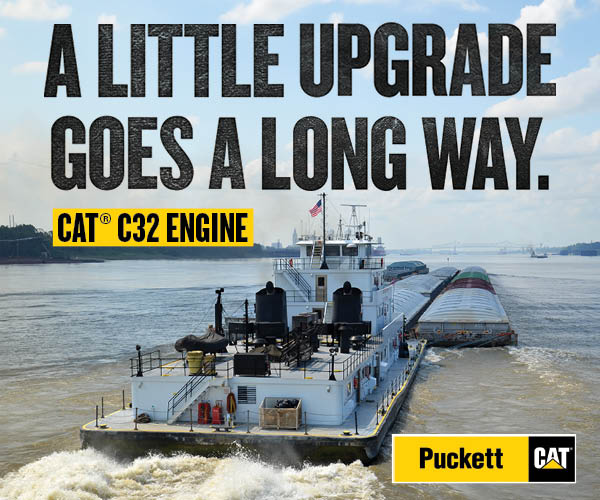Coast Guard Investigation Finds No Spill From American Towboat In Panama
An independent investigation and analysis of oil samples recently concluded by the United States Coast Guard has refuted the contention of the Panamanian Maritime Authority that the mv. Karen Koby, operated by LA Carriers LLC, was responsible for an alleged oil spill in 2021 that affected a coastal mangrove area. The Panama court has not yet made a final ruling in the case. (See also: Coast Guard Marine Investigations Can Span The Globe, WJ, May 30, 2022.)
The case originated with the events of November 16, 2021, when American-flagged tugboat Karen Koby, towing an empty oil barge, Logicon 412, was alleged to have spilled some oil in the area of Panama Bahía Las Minas, Cativa, Colon, near some coastal mangrove swamps. The Panama Maritime Authority (AMP, its Spanish acronym) detained the vessel for nearly six months and obtained statements from crewmembers and witnesses. The AMP claimed to have conducted a preliminary investigation and sampled the oil spilled, alleging that the spill came from the Logicon 412.
The Karen Koby was released in February 2022 and continues to operate. The barge owners, who are Colombian, were never charged in connection with the alleged spill. The Karen Koby was delivering the barge to Colombia when the alleged spill occurred.
Even though a request was made by the U.S. Coast Guard based on International Maritime Organization protocol and through the submission of a Substantially Interested State filing with the AMP, a joint investigation was not conducted by AMP, and the AMP’s conduct of its investigation has since raised a number of questions about its allegations against LA Carriers and the Karen Koby. Although requested by the Coast Guard, the AMP never provided split spill samples to the Coast Guard for testing as is customary in these investigations under IMO protocol, and those samples were later destroyed by the Panamanian lab because the submitter, the AMP, failed to request an extension beyond 90 days, which the lab claimed is the normal period after which it disposes of samples.
According to a source connected with the case, the AMP filed no evidence with the Panamanian Maritime Court supporting its claims against LA Carriers or the Karen Koby, as required by Panamanian law. The Coast Guard conducted its own investigation and sampling of the spill area as directed by the AMP investigative team. (See WJ, May 30, 2022.) Its lab analysis was carried out at the U.S. Coast Guard’s Marine Safety Laboratory in New London, Conn., and it compared the oil spill samples obtained by the Coast Guard from the residue left in the barge and the Karen Koby’s fuel.
“Based on the available evidence analyzed and reviewed to date, my U.S. Coast Guard investigation has not obtained evidence indicating that the tank barge Logicon 412 or towing vessel Karen Koby contributed to the asphalt spill that impacted the port of Colon,” according to a letter sent by U.S. Coast Guard Capt. Jason D. Neubauer to Capt. Elizeo Carrizo of the AMP. The lab further concluded that “the differences are not due to weathering and that the MSL has concluded that the spill samples and barge samples are not derived from a common source of petroleum oil.”
In conducting foreign investigations, the Coast Guard acts as a fact collector only; it does not get involved in the determination of criminal or civil violations of the laws of other states. The document that guides the Coast Guard’s foreign investigations is Navigation and Vessel Inspection Circular No. 05-17. Issued in 2017 and titled “Reporting and Investigating Marine Casualties Where the United States is a Substantially Interested State (SIS),” it replaced a 1998 guidance. Marine investigations are carried out in cooperation with the authorities of the other country, in accordance with IMO protocols.
According to a source connected with the case, the AMP investigative team that directed the Coast Guard’s sampling team to the mangrove area and identified for the Coast Guard the exact same oil that came from the spill were made up of the same Panamanian investigators that have been involved from the beginning.
The AMP also advised the Coast Guard that the initial spill amount was only of 8 barrels, not the 8,500 barrels of its initial complaint, but said that the method they used to calculate spill impact for “environmental impact purposes” converts the 8 barrels to 8,500 barrels.
To this day, the AMP continues to pursue LA Carriers in an effort to collect an alleged $4 million in cleanup costs and $250,000 in fines and penalties, notwithstanding that it allowed the destruction of the oil spill samples that were held by AMP’s lab, and the Coast Guard’s findings.
The U.S. Congress is aware of the case, according to the source, and has engaged with the Coast Guard and the State Department, inquiring how the AMP can hold a U.S.-flag vessel owner liable for a spill that the Coast Guard has found it not liable for.



